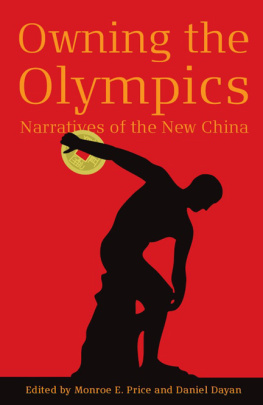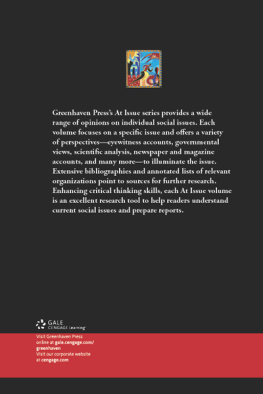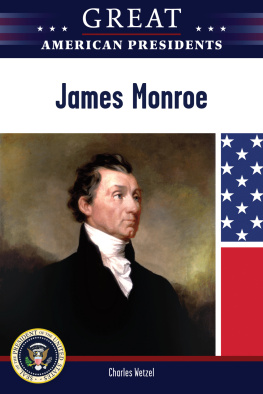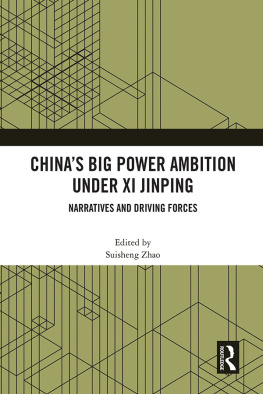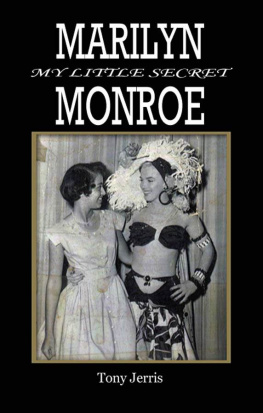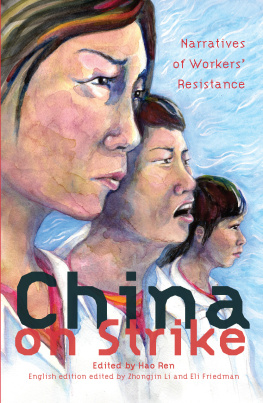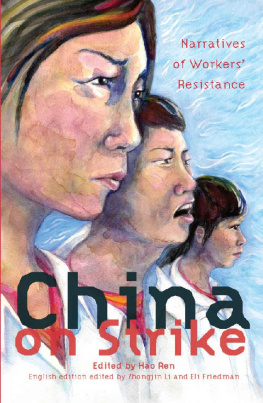Price Monroe E. - Owning the Olympics: Narratives of the New China
Here you can read online Price Monroe E. - Owning the Olympics: Narratives of the New China full text of the book (entire story) in english for free. Download pdf and epub, get meaning, cover and reviews about this ebook. year: 2018, publisher: University of Michigan Press, genre: Politics. Description of the work, (preface) as well as reviews are available. Best literature library LitArk.com created for fans of good reading and offers a wide selection of genres:
Romance novel
Science fiction
Adventure
Detective
Science
History
Home and family
Prose
Art
Politics
Computer
Non-fiction
Religion
Business
Children
Humor
Choose a favorite category and find really read worthwhile books. Enjoy immersion in the world of imagination, feel the emotions of the characters or learn something new for yourself, make an fascinating discovery.
- Book:Owning the Olympics: Narratives of the New China
- Author:
- Publisher:University of Michigan Press
- Genre:
- Year:2018
- Rating:3 / 5
- Favourites:Add to favourites
- Your mark:
- 60
- 1
- 2
- 3
- 4
- 5
Owning the Olympics: Narratives of the New China: summary, description and annotation
We offer to read an annotation, description, summary or preface (depends on what the author of the book "Owning the Olympics: Narratives of the New China" wrote himself). If you haven't found the necessary information about the book — write in the comments, we will try to find it.
Owning the Olympics: Narratives of the New China — read online for free the complete book (whole text) full work
Below is the text of the book, divided by pages. System saving the place of the last page read, allows you to conveniently read the book "Owning the Olympics: Narratives of the New China" online for free, without having to search again every time where you left off. Put a bookmark, and you can go to the page where you finished reading at any time.
Font size:
Interval:
Bookmark:
 Page i Page ii Page iii
Page i Page ii Page iii Narratives of the New China
Monroe E. Price and Daniel Dayan, Editors
THE UNIVERSITY OF MICHIGAN PRESS and THE UNIVERSITY OF MICHIGAN LIBRARY
Ann Arbor
Copyright by Monroe E. Price and Daniel Dayan 2008
All rights reserved
Published in the United States of America by
The University of Michigan Press
Manufactured in the United States of America Printed on acid-free paper
Printed on acid-free paper
2011 2010 2009 2008 4 3 2 1
No part of this publication may be reproduced,
stored in a retrieval system, or transmitted in any form
or by any means, electronic, mechanical, or otherwise,
without the written permission of the publisher.
A CIP catalog record for this book is available from the British Library.
ISBN13: 9780472070329 (cloth : alk. paper)
ISBN10: 0472070320 (cloth : alk. paper)
ISBN13: 9780472050321 (paper : alk. paper)
ISBN10: 047205032X (paper : alk. paper)
ISBN13: 9780472024506 (electronic)
- Page vi
Monroe E. Price
I t was precisely one year before the 2008 Olympic Games would begin, and a deep smog covered Beijing. The day, August 8, 2007, was filled with the symbolism of anticipation. An official ceremony, triggered by the magic moment marked on a special clock, began the grand unveiling, with 10,000 carefully selected people celebrating in Tiananmen Square. This would be the best and the biggest Countdown Ceremony in Olympic history precisely because it could be no other way. Everything about Beijing 2008 had to be spectacular, superlative, outsized. At least such was the hope of China and the Beijing Organizing Committee for the Games of the XXIX Olympiad (BOCOG). Even the smog, reframed as just another barrier for the powers that be to overcome, would be turned into a sign of what Beijing could and would accomplish.
That day and the week surrounding it were a dress rehearsal not only for the Olympics' officials but also for those seeking to seize the occasion to make their own global point. The very day of the countdown ceremony a group of young Canadians and others sought to subvert the official line and gain global press notoriety by rappelling down a portion of the Great Wall to reveal a banner emblazoned with the words One World, One Dream, Free Tibet. That week, as well, Reporters Without Borders staged a demonstration with participants wearing T-shirts that depicted the Olympic Rings transmogrified into Page 2 handcuffs. And Amnesty International (2007), Human Rights Watch, and the Committee to Protect Journalists (2007) all used the countdown moment to issue sober and critical reports on China's shortcomings in the field of human rights.
The staged happenings that week, official and unofficial, serve as a metaphorical preface to this book on narratives and counternarratives. They offered a foretaste of this extraordinary chapter in the history of sport, media events, the evolution of China, and the shaping of global civil society. What occurred then encapsulated the contradictions in the Games, the many and diverse efforts to control how they are understood, and the global interest in their outcome. Rather than one strong unified message, the Beijing Olympics had already become polyphonic, multivoiced, many themed.
In view of this multiplicity of competing voices and themes, it may be worth starting with what, from an Olympics point of view, could be deemed the official story. The chair of the International Olympic Committee (IOC), Jacques Rogge, was present at the Tiananmen celebration to give the blessing of the IOC, and he praised the already completed achievements. The physical markers of the Olympicsthe great stadiawere almost all standing, built not only on time but ahead of schedule and, thus, strong symbols of China's ability to conceive grandly and execute with efficiency. Another high official, Liu Qi, BOCOG's president, attributed to the people of Beijing a phrase that captured the sense of solidarity that China wished to communicate. Beijingers, he said, had expressed their relationship to the Games with this minor chant: I participate, I contribute, I enjoy (Yardley 2007). Xinhua, the official Chinese news agency, also conveyed the impression that a nationwide consensus marked this hallmark moment:
Across the country, Chinese people are celebrating the occasion in various ways. In the city square of Urumqi, capital of northwest China's Xinjiang Uygur Autonomous Region, residents performed roller-skating, martial arts and Taiji under red banners reading Fitness campaign to welcome the 2008 Olympics. More than two thousand Tibetan natives and tourists gathered on Wednesday morning in Lhasa to mark the countdown. The celebration starts with a domino display by 2,008 middle school students from Lhasa as they dropped to the ground one after another on the plaza before the Potala Palace, forming the pattern of the Olympic rings and the number 2008. I am honored to be part of the celebration and I hope I can visit Beijing to watch the games next year, said Ouzhu, an 18-year-old Tibetan student. Residents in Page 3 Beijing found various ways to express their joy. A resident named Zhao Yue'e in Huanghuamen community around Jingshan in downtown Beijing gathered with friends at the countdown clock in her community. We are not just waiting for the Games, we are welcoming and expecting it to come, she said. (2007)
With a remarkable lack of irony, the authorities were responding to various kinds of global criticism. While the Olympics had undoubtedly united the residents of Beijing present, these images of Beijing solidarity were in stark contrast to the claims of many, including the Geneva Centre on Housing Rights and Evictions, which had in June published an extensive critical study on the impact of the Olympics on the destruction of housing (COHRE 2007). And Xinhua, by invoking joy in Tibet, was taking on the highly controversial issue of China and human rights.
One could feel the tensions generated by the various efforts to fix the meaning of and define these Games through news accounts across the world, a large number of which featured unofficial narratives not sponsored or devised by the IOC or China. The big story in the New York Times on Countdown Day dealt with the counternarrative that was the subject of the Geneva study: the human and aesthetic cost involved in the massive patterns of destruction in Beijing (Yardley 2007). Under the headline, In Beijing, a Little Building Is Defying Olympic Ambitions, Jim Yardley wrote, The two-story building where Ms. Sun's ancestors opened a bakery in the 1840stheir clientele included the Qing emperor and his courthas been on Beijing's demolition list since Monday. Local officials have notified the Sun family that the building is along the route of the Olympic marathon. Land is needed for a beautification project. A bulldozer is parked outside. Demolition is not new in the surrounding Qianmen area, a historic neighborhood being razed and rebuilt as a shopping district for the Olympics. What is unique is that Ms. Sun is refusing to leave. She is the last holdout on a street once lined with shops. Landscapers have already covered the rest of the block with saplings and a sheet of green grass. Her building is an unsightly stump marring the view.
The Los Angeles Times marked the occasion by raising other themes relating to human rights. In an editorial, it concluded that it is consumers, the international media and cultural colossi such as Steven Spielbergnot preachy foreign governmentswho can best further reform in China by speaking out before the Olympic torch arrives. We Page 4 wish China peace, prosperity and successful Gamesbut not a system that jails journalists, silences dissidents and ignores the brutalization of the people who make the products the world enjoys (2007).
Font size:
Interval:
Bookmark:
Similar books «Owning the Olympics: Narratives of the New China»
Look at similar books to Owning the Olympics: Narratives of the New China. We have selected literature similar in name and meaning in the hope of providing readers with more options to find new, interesting, not yet read works.
Discussion, reviews of the book Owning the Olympics: Narratives of the New China and just readers' own opinions. Leave your comments, write what you think about the work, its meaning or the main characters. Specify what exactly you liked and what you didn't like, and why you think so.

